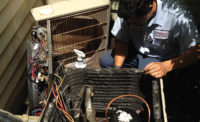Unfortunately, it doesn’t look as if Mother Nature is going to cooperate this winter.
The National Weather Service predicts that in December, January, and February, about two-thirds of the country will be warmer than normal. Imagine a line drawn from southern California to southern New England: Everything south of that line is expected to be warm. And this warmth is supposed to continue into the next time period as well.
The only colder-than-normal area is expected to be western Washington and northwest Oregon.
But just because the weather isn’t as lousy as we’d like it to be, doesn’t mean that profits have to suffer. Now is the perfect time to pull out those service agreements and start scheduling routine maintenance calls.
What? You don’t have an active service agreement program? You might just have a tougher time this winter. But take heart — now is the perfect time to start implementing a program that will carry you through the next slow season.
Attitude shift
It seems strange to think that an hvac contracting firm wouldn’t routinely offer service agreements to its customers. After all, you can’t so much as buy a toaster from the local Best Buy without having a salesperson trying to sell you a maintenance contract.Many contractors don’t offer service agreements, though, because they view them as a pain in the neck, says Steve Howard, well-known hvacr expert who writes books and articles, consults, and conducts seminars on service agreements.
“Service agreements are a pain if you don’t have a process in place,” Howard says. And a poorly conceived program is almost worse than not having any system in place at all, because it means the customer usually ends up feeling short-changed.
Howard says the intention behind any service agreement program should be to help the customer. “The whole idea is to provide a higher level of customer satisfaction; it’s not just to sell something because you need the work. The whole idea is to find out how we can better serve our customers by making them more comfortable.”
He adds that virtually every home in America needs something that an hvac contractor can provide to make it more comfortable. The key is to be alert while on a service call, see what else the customer might need. Then, ask the simple question: “Is there anything else you’d like me to look at while I’m out here?” Or, try the ever-popular, “Are you comfortable in your home?”
Even if the customer isn’t amenable to any further repairs or upgrades at that moment, keep a list back at the office. Howard remembers when he was a service manager in Phoenix: “I would make everybody fill out a form on every call that showed additional work and additional problems found. When it got slow, I would cull through those, call customers, and set up service calls.”
One company that will be busy on service agreement calls this winter is Peachtree Service Experts, Duluth, GA. Jackie Rainwater, president of Peachtree, has 38 years of experience in the business. For the last 10 years, his company has been working diligently to build a large service agreement customer base. And it has succeeded.
“Presently we employ 67 service technicians. We have approximately 18,500 ‘precision tune-ups,’ ‘professional cleanings,’ and ‘safety inspections’ to perform during the four-month Atlanta winter. Divide this number by our 67 technicians and you will see that, on average, each technician will be required to perform 276 heating system tune-ups during the next 16 weeks.
“Add demand service calls, and there will be absolutely no problems keeping our technicians busy and productive, even if we have a mild winter,” says Rainwater.
While it’s really too late for a service agreement program to help this winter, it’s never too late to start — or to change your attitude. “Service agreements have to be the focal point of everything we do. Every call we go on, we have to look at offering the service agreement, because it gives us an opportunity.
“We have to maximize every opportunity we’re in front of the customer to help increase the level of satisfaction for that customer,” says Howard.
Customers reap benefits
Contractors continually say that they’re not comfortable having their technicians sell service agreements (or upgrades and add-ons, for that matter), because they think the sales aspect hurts their credibility. This is definitely a concern. Customers certainly don’t want technicians scoping their home for future sales.Howard says the way to get over this obstacle is to have customers sell themselves a service agreement. Customers value technicians’ opinions and recommendations and often follow their advice. The easiest way to offer a service agreement is when on a service call, simply ask, “Would you like some information on how to keep problems like this from happening again?”
That’s a prime opportunity to explain how the service agreement works. “If the customer wants the technician to discuss how the agreement will reduce future problems, he’s not selling. He’s just explaining. He’s a resource,” says Howard.
“The contractor who says he doesn’t want his technicians doing this is, in effect, saying that he doesn’t want to make his customers as happy as they can be.”
Rainwater notes that his company actively promotes service agreements year-round. But he adds that training employees to sell service agreements first requires the employees to buy into the fact that service agreements are a very worthwhile investment for customers.
“Training them to sell service agreements starts after we have first sold our own people on the true value of service agreements. Comprehensive training then takes place both in our training room, conducted by our director of training, and in the field by experienced technicians who have a proven service agreement sales record.”
Rainwater says that everyone in the company who comes into contact with customers is trained to promote the benefits of the service agreement program. Only Peachtree’s service technicians, installation technicians, and comfort advisors (sales personnel) are allowed to actually close the sale, though, and this is done while in the customer’s home or business.
Contractors sometimes seem afraid they’ll insult customers by trying to sell them something. But Howard notes that it’s far more insulting to not offer customers an opportunity to maximize the comfort of their home, as well as reap other benefits. And the benefits are huge.
For example, a study performed by the Louisiana State University Cooperative Extension Service addressed the question of how much a homeowner can save with preventive maintenance. At an electrical rate of $0.08/kWh and an outside temperature that reached above 88ÞF, a homeowner would save $6.83/month if the unit was in good condition and up to $77.04/month if the unit was in poor condition.
Another study performed by Air Conditioning Training and Consulting and Murphy Engineering compiled 18 months of data from more than 200 air conditioning units and heat pumps ranging in capacity from 1.5 to 7.5 tons. Most of the equipment evaluated was seven to 25 years old.
The results showed that 75% of the units had dirty condenser coils, 70% had an improper refrigerant charge, 55% had dirty evaporator coils, 45% had dirty blower wheels, 35% had duct leaks, and 10% had the wrong fan motor or fan blade installed.
The study concluded that, depending on the severity of the problems, savings of more than $100 per rated ton per year are possible where maintenance has been poor or non-existent.
It’s also important to show customers how a service agreement can help keep them more comfortable, because it ensures the equipment will be kept in proper working condition.
Explaining these benefits will help customers understand how a service agreement can help make their lives easier. Then it’s up to the customers to decide whether or not they want to save money, be more comfortable, and reduce the hassles in their already-too-busy lives.
Seems like a no-brainer.
“The most common objections customers have for not investing in a service agreement stem from simply not understanding the many benefits and overall value of the agreement,” says Rainwater. “After thoroughly informing and educating customers regarding the benefits and the great value, we have a very high closure rate.”
Last Words
If you’re still not convinced that starting a service agreement program is the way to go, Howard says to consider these benefits:- Â For every dollar in income from inspection service agreements, you can expect to receive $2 to $10 in repairs, upgrades, changeouts, and additional services.
- Â Expect to get referrals from up to 70% of your service agreement customers every year.
- Â And when it’s time to replace the hot water heater, furnace, or air conditioning system, expect to get this work from 86% of your service agreement customers.






